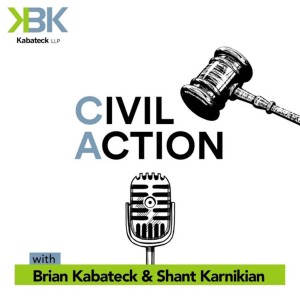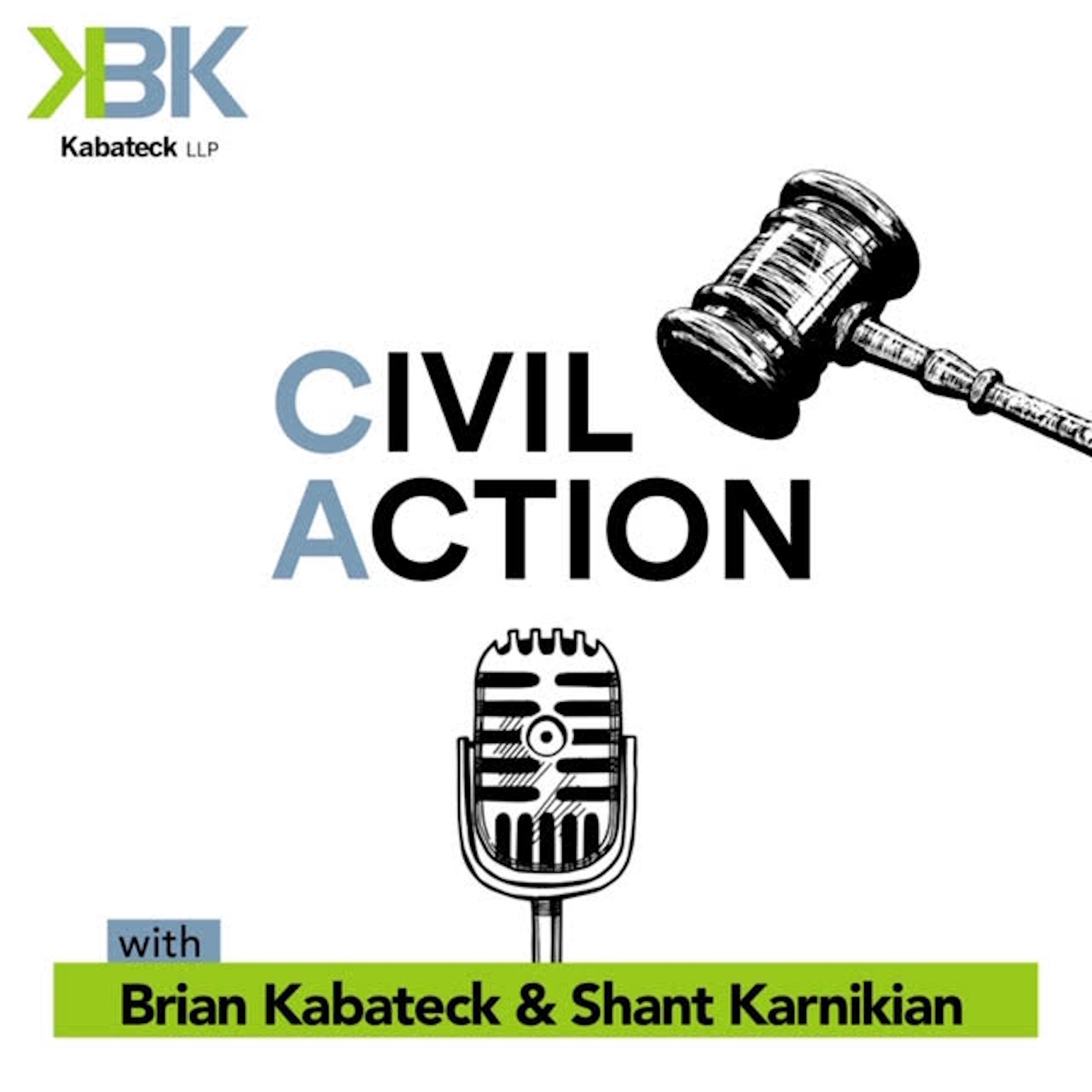Episodes

Monday Jun 08, 2020
46. Civil Procedure Cases Pt. 1
Monday Jun 08, 2020
Monday Jun 08, 2020
Zehia v Sup Court of San Diego County (4th DCA)
Personal Jurisdiction in the Electronic Defamation Action
Torres v Design Group Facility Solutions (2nd DCA)
Renewed Motion for Summary Judgment Disguised as a Motion for Reconsideration
Grande v Eisenhower Medical Center and Flexcare (4th DCA)
Scope of Release Under the Dual Employer Theory
Dumas v LA County Board of Supervisors (2nd DCA)
Meet and Confer Requirement for Demurrers

Wednesday Jun 03, 2020
45. Consumer Protection Cases Pt. 1
Wednesday Jun 03, 2020
Wednesday Jun 03, 2020
Cases this week:
Schaeffer v Califia Farms LLC (2nd DCA)
What Constitutes A False Statement in a False Advertising Case
Rincon EV Realty LLC v CP III Rincon Towers (1st DCA)
Overlap Between Legal Claims and Equitable Claims
Walker v Fred Meyer Inc. (9th Circuit)
Disclosure Requirements under the Fair Credit Reporting Act
Campbell v Facebook (9th Circuit)
Overruling Objection to Settlement with Facebook.

Monday Jun 01, 2020
44. Guest Interview w/ Attorney & Arbitrator Lee Straus
Monday Jun 01, 2020
Monday Jun 01, 2020
Brian and Shant have an in-depth discussion with attorney and arbitrator Lee Straus about a case reviewed on a prior Civil Action podcast. Mr. Straus breaks down the subtleties of the case and further explains the purpose and reasoning behind his ruling. They also discuss Straus’ involvement and development in the State Bar’s Mandatory Fee Arbitration program where he is heavily involved.
Please note: Mr. Straus would like to clarify that all fee disputes between an attorney and client(s) require the attorney to send the State Bar approved Notice of Client’s Right to Fee Arbitration form to the client(s) pursuant to B&PC § 6201.

Friday May 29, 2020
43. Guest Interview w/ Attorney Ellen Pansky
Friday May 29, 2020
Friday May 29, 2020
Brian sits down with ethics attorney Ellen Pansky, remotely, to discuss COVID-19 and its impact on virtual court and other legal proceedings and her work as an advocate for matters involving the state bar’s regulations on professional conduct.

Friday May 08, 2020
42. Guest Interview w/ Restaurateur Philip Camino
Friday May 08, 2020
Friday May 08, 2020
Brian and Michael Childress sit down with Philip Camino of Camino Industries. Philip owns and operates Fellow (www.fellow.la) among other hospitality venues in Los Angeles and nationally, including The Hudson, Earthbar, and Stout. Philip shares his perspective on the hospitality industry pre and post-COVID, and looks to the future with a positive lens. A person of immediate action, Philip wasted no time in making crucial business decisions to help preserve his restaurants and seek the assistance of an experienced team to help him address his business interruption concerns.

Thursday May 07, 2020
41. COVID-19 and Its Impact on the July 2020 CA Bar Exam
Thursday May 07, 2020
Thursday May 07, 2020
Brian and guest host, Serena Vartazarian speak with Loyola law student and Kabateck LLP law clerk, Gary Partamian about COVID-19, its effect on his final semester as a law student. Gary gives his impressions on the impact the pandemic has on the California Bar Exam, and what he’s doing to prepare for either postponement or an altogether cancellation until COVID-19 concerns have been further alleviated.

Monday May 04, 2020
Monday May 04, 2020
Wilson v. Huuuge Inc.
Brian and Shant discuss a class action based on a browsewrap arbitration agreement’s requirements. Seemingly hidden, the consumer would have had to vigorously search through the website to find the agreement’s terms. Accessibility to the terms dictate the determination of the outcome here.
Philadelphia Indemnity Ins. Co. v. SMG Holdings, Inc.
Brian and Shant discuss an additional named insurer added at the request of a named insurer to determine whether it can seek indemnification from the added party. The added insurer argues that because the named original insurer denied coverage indemnification does not apply.
Barranco v. 3D systems Corp
Brian and Shant discuss the purchase agreement between two companies where one requested to introduce the prevailing arbitration award in their prior contract action. The request was denied by the trial court and the appeals court reviewed the denial as an abuse of discretion and ultimately upheld trial court’s decision.
Aloca Dos Vientos v. CalAtlantic Group, Inc. 2nd DCA
Brian and Shant discuss condominium associations and the arbitration agreements that are at issue in construction defect litigation. Covenants Conditions & Restrictions require that if an action is brought against the builder it must be done through arbitration. Generally, builders and HOAs have been granted a number of protections that must be considered prior to bringing an action.

Thursday Apr 30, 2020
Thursday Apr 30, 2020
Becerra v. Dr. Pepper
Brian and Shant discuss the use of the word “diet” and whether it misled consumers to believe that diet soda would likely promote weight loss. Multiple dictionaries were used to understand what the word “diet’ is meant to convey, but the determination is based on the reasonable consumer test.
Stimpson v. Midland Credit Management
Brian and Shant discuss defaulted payment to a creditor. The debt went into collections and the resulting action analyzed the statute of limitations of a debt in credit report. A time-barred debt although not actionable in court, is not discharged.
Patel v. Mercedes Benz USA
Brian and Shant discuss the Song-Beverly Consumer Warranty Act. The trial court discovered that the named plaintiff was not making the payments but rather another party. Attorney fees were recoverable although the prevailing party was not the named party to the action.
Smith v. LoanMe, Inc
Brian and Shant discuss the legality of recorded telephone calls with business entities. The CA Privacy Act, Section 632.7 specifically does not allow the recording of a phone call without consent. What’s perplexing is that the legislative intent seems to imply that the Act was implemented to require consent of all parties and prevent eavesdropping.

Tuesday Apr 28, 2020
Tuesday Apr 28, 2020
People v. Royal
Brian and Shant discuss the past recollection recorded exception to the hearsay rule and the elements that trigger the exception. They court examined the time element and determined that too much time had expired from the event itself to the time the recollection was recorded.
McDermott Ranch v. Connolly Ranch
Brian and Shant discuss a case arising out of a property dispute stemming from a real estate transaction from 1958. They unwrap a carved-out hearsay exception based on the statements being made in connection with the boundary of land of real property.
Blizzard Energy v. Schaefers
Brian and Shant discuss the Sister State Money Judgment Act, taking a judgment from one state and enforcing it in another state. The rule preserves the Res Judicata principle, in that once a matter is fully litigated, the parties are precluded from relitigating absent additional requirements.
PG&E San Bruno Fire Cases
Brian and Shant discuss the allocation of attorney fees from the determination of a special master. The agreement stated that the determination was not appealable but the language was introduced only once in the document leading to a dispute between the parties.

Friday Apr 17, 2020
37. Discussion with Harry Chamberlain II
Friday Apr 17, 2020
Friday Apr 17, 2020
Brian and Shant sit down with appellate attorney Harry Chamberlain to discuss the origins of the of the Anti-SLAPP statute, protecting the free speech of lawyers, and tips for preserving a good record for appeal. Harry is certified as an Appellate Specialist by the California State Bar Board of Legal Specialization, handling hundreds of appeals across the country, including numerous cases before California Supreme Court such as Rubin v. Green (absolute litigation privilege), Jarrow Formulas v. LaMarche (First Amendment protections under the anti-SLAPP statute), Temple Hospital and Cedars Sinai Medical Center v. Superior Court (the “spoliation” cases) and Lee v.Hanley (defining a lawyer’s “professional services” for purposes of the one-year statute of limitation).

